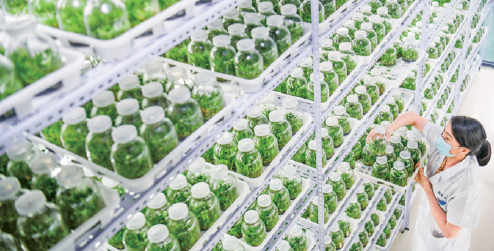In the early morning in Shicha village in Haikou, capital city of Hainan province, tapping sounds can be heard coming from the garden of dendrobium, a herbal plant in the orchid family. This is the sound of hammers that locals use to anchor dendrobium sprouts in volcanic rocks.
As the first rays of sun pierce the forest canopy, these medicinal herbs anchored in the crevices stand erect, as if to cloak themselves in the golden light.
Over the past four years, residents of Shicha have made great efforts to develop dendrobium cultivation. The area of land planted with this herb flower has expanded from 13.33 hectares in 2018 to 37.33 hectares in 2021. The per capita annual income of villagers has risen from 18,830 yuan ($2,696) in 2018 to 32,000 yuan in 2021. The village has thus embarked on a unique path of rural vitalization.
Shicha is located at the foot of Hainan's highest volcano crater. Over 90 percent of the village is covered in volcanic rock. For thousands of years, villagers survived by cultivating the land between the rocks.
"There was volcanic rock everywhere. Residents used to pile up the rocks in order to squeeze out small patches of land for planting cassava and sweet potato. The entire village struggled desperately to eke out a living," local resident Hong Shangke said.
To turn things around, the village's officials have led residents in exploring a new development path. In 2015, the village established a cooperative. Villagers were encouraged to become shareholders by contributing their rocky and uncultivatable land. These lands were then planted with dendrobiums.
To solve the technical issues they've encountered in cultivation in recent years, villagers have brought in experts to develop solutions, thereby further boosting seed breeding capacity and enhancing yields.
In 2020, the tissue culture laboratory in the village cultivated dendrobium seedlings that could be planted directly in the volcanic rock — an innovation that was granted a Chinese patent. Today, the strengths of the herbal plant industry chain at the village are becoming much more evident, and the reputation of volcanic dendrobium is gaining new luster.
Shicha village is decorated in a striking mix of colors, thanks to its jet-black volcanic rocks, fresh green dendrobiums and red volcanic roses.
Taking advantage of Shicha's proximity to Hainan's volcano crater park and the reputation of volcanic dendrobium, tourism in the village has flourished. To promote agri-leisure activities and rural tourism, Shicha has developed a 20-kilometer volcanic tourist trail, which incorporates five volcanic craters, nine lava caves and eight ecological conservation areas.
Applying an integrated innovation model for agriculture, culture and tourism, Shicha has propelled the development of such sectors as dendrobium cultivation, homestay, family tradition exhibition, Red tourism and local village culture.
In 2021, the volcanic dendrobium garden in the village received 35,000 tourist visits, and the catering and homestay sectors generated 20 million yuan in revenue, signaling the emergence of a new pattern of integrated tourism.
Lu Qingsong, a college graduate, is glad that he decided to return to the village to start a business. Today, his business, the Original Taste Garden, is thriving. He also has plans to join forces with a tour company to open a homestay.
"On weekends and holidays, the village is full of tourists. People come to hike, stay in a homestay, and taste the local farmhouse cuisine. When they depart, they also take specialty products with them. The response from tourists has been very positive," Li said.

A staff member observes the growth of dendrobium seedlings at the Shengrong Dendrobium Tissue Culture R&D Center in Shicha village. WANG CHENGLONG/FOR CHINA DAILY